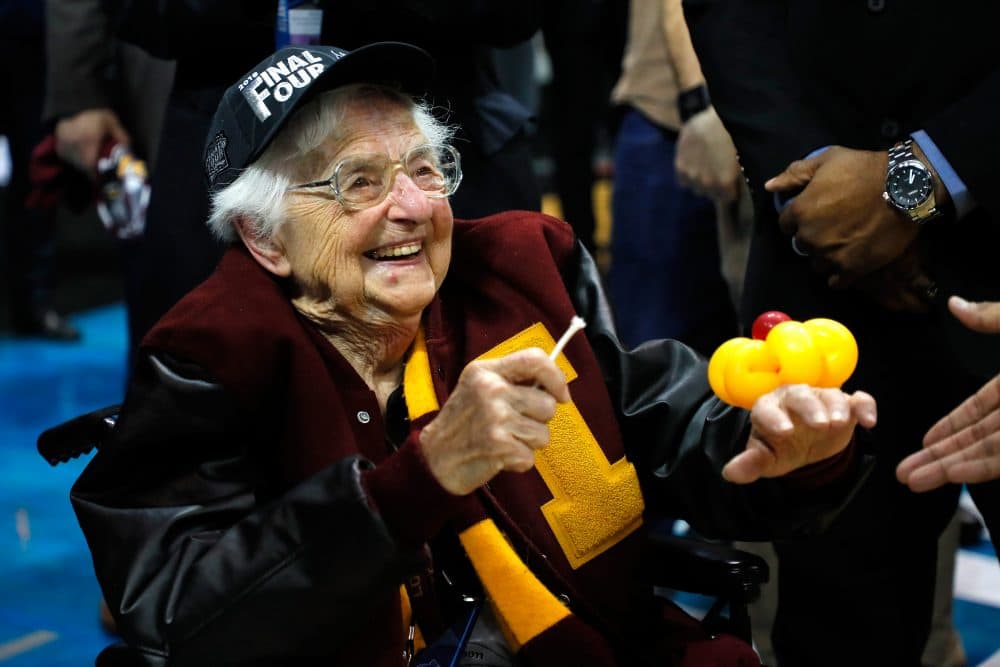Advertisement
Why Americans Historically Love An Underdog
Resume
The NCAA men's basketball Final Four tips off Saturday, starting with the University of Michigan against No. 11 seed Loyola University Chicago — which earned four consecutive wins en route to becoming this season's March Madness Cinderella story.
According to historians Ed Ayers and Brian Balogh, Americans have long rooted for the underdog.
Here & Now's Robin Young speaks with Ayers (@edward_l_ayers) and Balogh (@historyfellow), co-hosts of the podcast "BackStory," which is produced at Virginia Humanities.
Interview Highlights
On how long rooting for the underdog has been part of American history
Ed Ayers: "Well, I think ever since 13 scrappy Colonies went up against the largest empire in the modern world. The beauty of America is everybody can think of themselves as an underdog in some way. The only true ones were the indigenous people who had home-court advantage but still ended up really suffering from all that. I think that it does seem to be something that's hardwired into the American psyche, to somehow cheer for people who seem as if they are up against the odds."
"I mean, I think that's what the country is really about — the American dream is everybody has a chance, and if you find that the underdogs don't have a chance, it kinda pokes holes in that dream."
Brian Balogh: "I do think it's human nature to root for underdogs. But I would argue there is something in American history probably pretty connected to not having an aristocracy or a ruling class ... that makes us feel that we all come from an even playing field, and the best man or woman should win the race."
"The American dream is everybody has a chance, and if you find that the underdogs don't have a chance, it kinda pokes holes in that dream."
Ed Ayers
On when President Abraham Lincoln was considered a dark horse
EA: "Well, his whole life, until he was elected president of the United States, in many ways. I was just visiting the Lincoln Museum in Springfield, Illinois, and [it was] very interesting to see how it's presented: You walk into the museum, and you take a left, and you're going into the log cabin, and there's a three-dimensional, life-size model of Abraham Lincoln reading by the fire, while everybody else in his family is asleep. You kind of have to go through that world, of when he works in a store, and you see his pant legs are too short and his shirt sleeves are too short. As much space is spent on representing Abraham Lincoln as an underdog as is spent on portraying him as the most powerful person in the United States."
On other prominent figures in American history seen as underdogs
BB: "We have people like Harry S. Truman, really came from a pretty impoverished background, was pretty unsuccessful himself in his business endeavors, and absolutely was not expected to win in the election of 1948. In fact, the most iconic photograph of Harry S. Truman is him holding up the newspaper saying that his opponent, Dewey, wins the election — which of course he didn't, Truman won.
"On the other hand, we have people like Donald Trump, who has styled himself as an underdog. I mean in fact, Donald Trump came from quite a wealthy background, but he's somebody who feels no matter what kind of advantage he has in politics, the whole system is rigged against him. I don't think you can understand Donald Trump unless you understand that the vast majority of people who voted for Clinton came from counties where the economy is contributing a disproportionate amount to the GDP, and those who voted for Trump came from counties where, where they live is underrepresented in America's economy. They are literally underdogs. They feel underrepresented."
"I think the exception to Americans always rooting for the underdog is that has not been the case when it has come to a majority of Americans rooting for African-Americans."
Brian Balogh
On Loyola-Chicago's Cinderella run in this year's March Madness
EA: "Being a historian, I wanna talk about Loyola-Chicago in a little more historical depth. I don't know if people remember, but they've been here before, and they were even larger underdogs because they had the audacity, if you can imagine this, to put four African-American players on the floor at the same time, when there was a kind of unspoken agreement that a team would play no more than three at a time. And then in the early 1960s, they win the national championship with four African-American players, and it's interesting that we now just think of them as being from a small conference or a small school or whatever, or we think about Sister Jean. But you could also see them as sort of a vehicle by which college basketball, American sports, kind of integrated itself."
BB: "And Ed always ends on an uplifting note. I'm gonna point out a somewhat depressing note: I think the exception to Americans always rooting for the underdog is that has not been the case when it has come to a majority of Americans rooting for African-Americans. I think quite often we found white Americans rooting for white athletes to beat African-American athletes, in whatever sport it was, internally. Now, Ed's right: When America goes to the Olympics [in 1936] and we're fighting against the Nazis, or competing against the Nazis, we can get behind Jesse Owens. But whether it's Jackie Robinson making his way up through the major leagues, or any of the heroic stories of African-Americans against the odds, people were not rooting for the underdog — meaning, the majority of American people."
This article was originally published on March 28, 2018.
This segment aired on March 28, 2018.